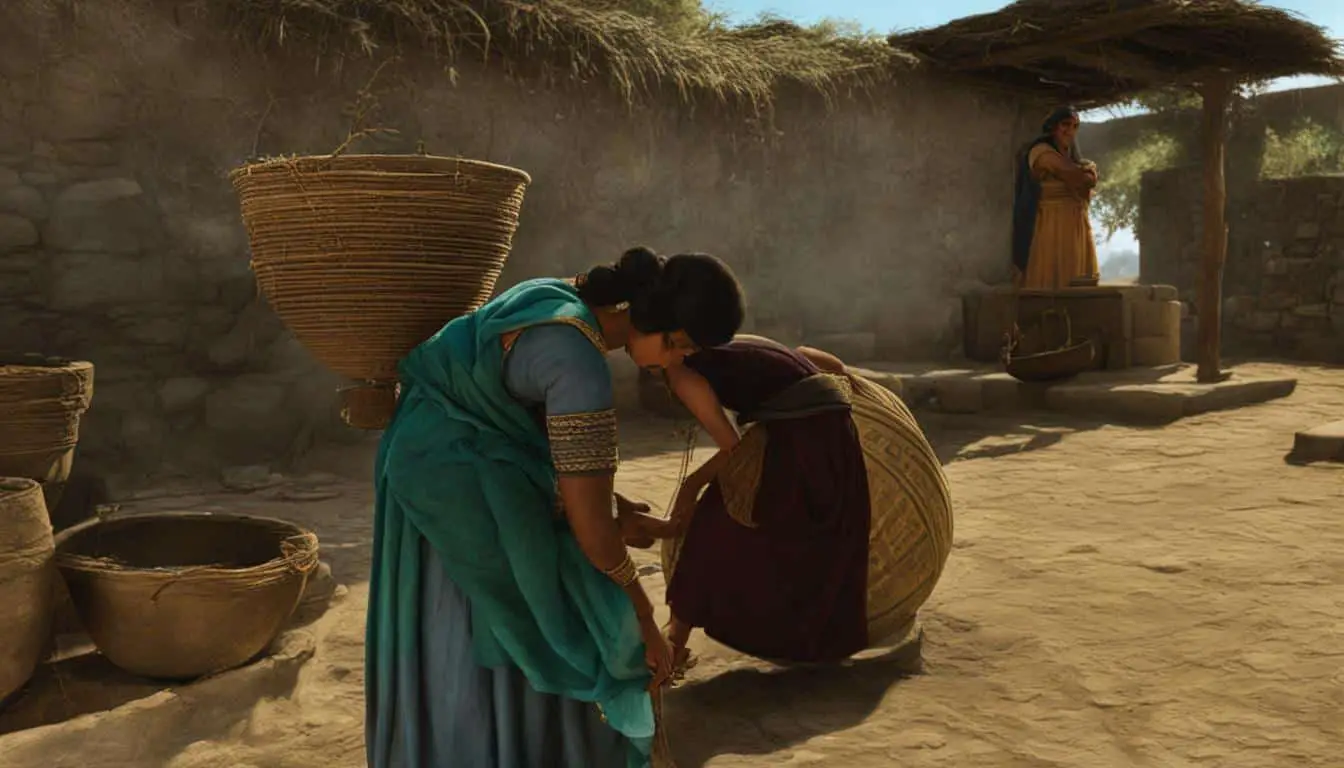
In biblical society, the role of women has undergone significant evolution over the centuries. From ancient times to the present day, women’s status and opportunities have been shaped by cultural, religious, and social factors. In this article, we will explore the role of women in biblical society both then and now, shedding light on their contributions, limitations, and the impact of Christianity on their status.
Key Takeaways:
- Women in biblical society have experienced changes in their roles and status over time.
- The Old Testament emphasizes the equality of men and women, highlighting their shared image of God.
- Throughout history, Jesus demonstrated love and respect for women, challenging societal norms.
- Women in the Bible played significant roles in key narratives, proving their value and worth.
- Christianity has elevated the status of women, recognizing their equal worth in the eyes of God.
Women in the Bible: An Elevated Status
When examining the role of women in biblical society, it is important to acknowledge that women in the Bible held an elevated status compared to the cultural norms of their time. Contrary to popular belief, women in ancient Israel were actively involved in various aspects of community life. They participated in commerce, engaged in real estate transactions, and even performed manual labor. The Bible recognizes women as venerated partners and cherished companions to their husbands, highlighting their importance beyond mere possessions.
In addition to their active roles in society, women played significant roles in key biblical narratives. Figures such as Miriam, Deborah, Huldah, and Abigail exemplify the strength and influence of women in ancient Israel. These women demonstrated courage, wisdom, and leadership, proving that they were not only capable but essential in shaping the course of history.
“The legacy of these biblical women continues to inspire and empower women today. Their stories serve as a reminder that women have always been an integral part of God’s plan and that their contributions should be valued and celebrated.”
Moreover, Jesus himself treated women with utmost dignity and respect, consistently challenging the societal norms of his time. He welcomed women as disciples, teaching and engaging with them in meaningful ways. Jesus’ interactions with women, such as the Samaritan woman at the well and Mary Magdalene, demonstrate his belief in their inherent worth and value.
In conclusion, women in the Bible held an elevated status compared to the prevailing cultural norms of their time. They were active participants in society, played significant roles in biblical narratives, and were treated with dignity and respect by Jesus himself. The stories of these biblical women continue to inspire and empower women today, reminding us of the equal worth and importance of both men and women in God’s plan.

The Impact of Christianity on the Status of Women
Christianity has had a profound impact on the status of women throughout history, challenging the cultural norms of ancient societies. In the biblical era, women in ancient Israel held a significant position in community life, actively participating in various spheres such as commerce, real estate, and manual labor. However, it was through Christianity that the status of women reached unprecedented heights.
The early church was revolutionary in its inclusion of women as disciples and its recognition of their invaluable contributions to the ministry. Women played pivotal roles in the spread of the gospel, working alongside men in preaching and teaching. This affirmation of women as equals to men was a radical departure from the prevailing customs of the time, which often marginalized and oppressed women.
The Bible, while emphasizing the equality of men and women, also acknowledges role distinctions based on the circumstances of creation. It recognizes the unique capabilities and responsibilities women possess as wives, mothers, and leaders in the church. Throughout history, the influence of Christianity has generally led to the elevation of women’s social, legal, and spiritual status. The spread of the gospel has sparked societal changes that have granted women greater rights, opportunities, and recognition.
Evidently, the impact of Christianity on the role of women in biblical society and beyond cannot be understated. Through its teachings and the example set by Jesus, Christianity has been instrumental in challenging social norms, promoting equality, and empowering women. Today, we continue to witness the positive effects of this transformation, as women find their rightful place in all aspects of society, inspired by the biblical perspectives on women’s roles.
FAQ
What is the role of women in biblical society?
In biblical society, women played significant roles as wives, mothers, and leaders in the church. They were actively involved in community life, including commerce, real estate, and manual labor.
How does the Old Testament view the equality of men and women?
The Old Testament emphasizes the equality of men and women, stating that both were created in the image of God.
How did Jesus treat women in his teachings and spiritual journey?
Jesus showed love and respect for women throughout his life, including them in his teachings and spiritual journey. He challenged the societal norms of his time by treating women with utmost dignity and respect.
What roles did women play in key biblical narratives?
Women played significant roles in key biblical narratives. Examples include Miriam, Deborah, Huldah, and Abigail, who exhibited leadership, courage, and wisdom.
How did Christianity impact the status of women?
Christianity elevated the status of women to an unprecedented height, challenging the cultural norms of ancient pagan societies. The early church included women as disciples and recognized their contributions to the ministry.
Does the Bible affirm women as equals to men?
Yes, the Bible affirms women as equals to men, while acknowledging role distinctions based on the circumstances of creation. Women are recognized as venerated partners and cherished companions to their husbands, not mere possessions.
How has the spread of the gospel affected women’s status throughout history?
Throughout history, the spread of the gospel has generally led to the elevation of women’s social, legal, and spiritual status.








